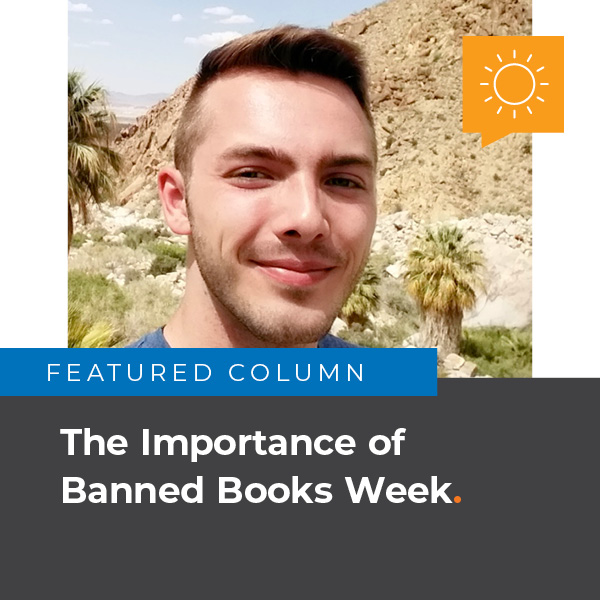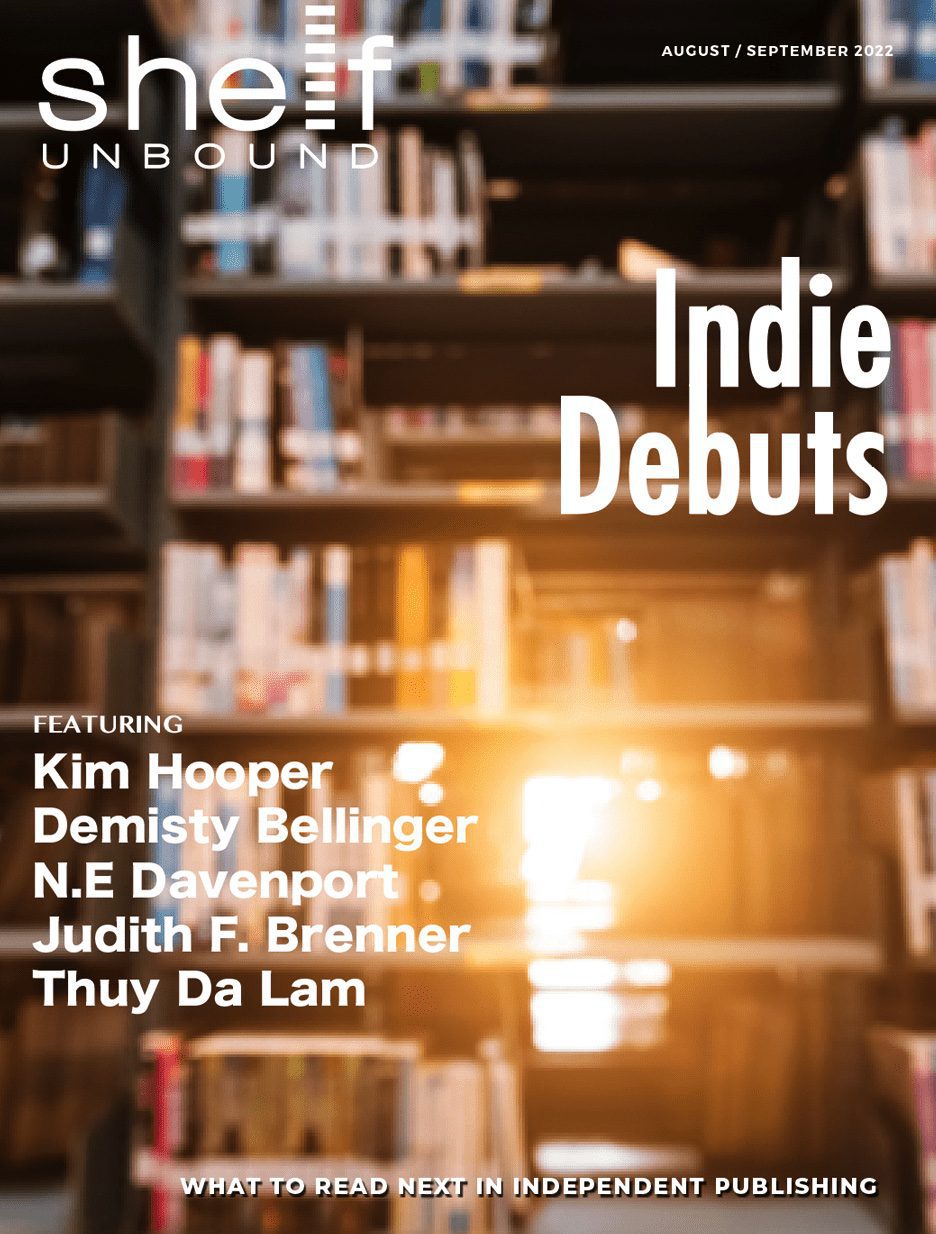By Wyatt Bandt

A school teacher near where I live caused quite a stir earlier in March when he read Jackie & Me, a children’s story about the Black Major League Baseball player, in class.
It was pretty standard fare apart from the fact he also said the n-word aloud while reading it.
There was community outrage. Some defended the teacher, some said the entire situation was wholly inappropriate, and some fell more in the middle, saying the book was appropriate but the teacher saying the slur was not. The book’s author, Dan Gutman, caught wind of the controversy and said in a now-deleted Facebook post that leaving out the n-word and other racial slurs would have been “sugarcoating the truth.”
The book was rumored to be removed from the school’s library, but that’s not been confirmed.
All the same, many books are taken from school shelves each year for being ‘controversial’ or ‘inappropriate.’
This is why Banned Books Week, which takes place September 26 through October 2 is so important. It makes us think about censorship. Along with that, it brings attention to those whose voices are being silenced.
Censorship Is Complicated
Censorship isn’t a new thing, and all of us have experienced it. And, there are many different kinds.
The first time the f-word was said on U.S. television was in 1981 on “Saturday Night Live” by Charles Rocket. He was subsequently fired.
Muslim authorities banned the 2022 Pixar film “Lightyear” in thirteen countries and the Palestine territory because of a lesbian kiss.
Facebook censors misleading content about COVID-19.
Many companies, including Magic: The Gathering, choose to censor media for China, removing imagery of bones and skeletons because they’re seen as bad luck or bad omens in the culture.
These are some of the more recent and less bloody examples of censorship, but they cover a few key arguments often surrounding censorship: what is appropriate, what is moral, what is authentic, and what is sensitive?
Disregarding those, the other motive is simply control, which is a whole other discussion.
Censorship is often viewed as a negative thing, but some of these examples are positive. Stopping the spread of misinformation is a good thing. Being culturally sensitive is a good thing.
Swearing on television, it depends on who you ask, but removing it altogether has no major negative side effects. However, some of these examples negatively impact the world. The censorship of “Lightyear” rejects the reality of the LGBTQ population. Unfortunately, censorship is the norm in many Middle Eastern countries, and it extends beyond this particular area. To make a blanket statement, censorship becomes negative when it both denies reality and controls people without a regard to what they may want. Not only does it make certain groups invisible, that silence can lead to a taboo building around a topic or even discrimination.
For example, many say Florida’s new “Don’t Say Gay” bill, which bans instruction on sexual orientation or gender identity in early education if it’s not “in a manner that is not age appropriate or developmentally appropriate” according to “state standards,” marginalizes and attacks LGBTQ people because it makes it seem like it shouldn’t be said. Starting that mindset young, that certain people’s lifestyles shouldn’t be allowed in certain settings or talked about, sets a dangerous precedent.
Especially in a place that’s meant to be used for learning.
The Purpose of Banned Books Week
Banned Books Week launched in the 1980s around the time the U.S. Supreme Court told schools that books can’t be banned from schools simply because of their content. More than forty years later, the movement reaches around 2.8 billion readers and more than 90,000 publishing industry and literary subscribers. The goal of the movement is to make sure that people can express ideas, even if those ideas are unusual or unpopular.
American Library Association’s Office for Intellectual Freedom monitors books that are “challenged” at schools across the country, focusing on books that address racism, racial justice, or those that share the stories of Black, Indigenous, or people of color. According to their list of most challenged books, many are challenged, banned, or restricted because they contain LGBTQ, sexual content, profanity, racism, or abuse, among other things. The quoted reasons are my favorite though, such as calling Persepolis “politically, racially, and socially offensive” even though it’s an autobiography.
While some of these things are commonly considered to be inappropriate for a school setting – profanity, racism, or sex – that doesn’t mean they aren’t very real things that happen in the world that people, children, deserve to know about. Hiding it doesn’t mean it doesn’t exist.
Anyone should be able to pick up and read a book about themselves, and just because something is in a piece of media – like racism or abuse – it doesn’t mean the media is saying that’s okay. Abuse is a horrible, ugly thing, but when a child who is being abused has a chance to see a protagonist find freedom from their abuser, the world is a better place.
I myself grew up in a rural, fairly sheltered, unintentionally censored household. I was homeschooled and isolated until my third year of high school, and it wasn’t until I’d been in the “real world” for a few years that I learned that growing up like that had some noticeable effects on how I viewed the world.
I looked down on people who drank, partied, swore, and had sex. I’d never been friends with a person of color or someone who was gay, despite being surrounded by harmful stereotypes about them. I’d have by no means considered myself a bad person, even in retrospect I don’t, but I certainly was ignorant. I wish I had learned one thing sooner: we’re all people, and we’re all trying our best.
Empathy was the answer, and that was only gained after I spent enough time coming into contact with different lifestyles, views, and upbringings.
The slogan for Banned Book Week 2022 is “Books Unite Us. Censorship Divides Us.” American Library Association’s Office for Intellectual Freedom says that sharing stories is sharing ourselves. Like the author Charles Jones said, you’re the same person you will be five years from now, the only difference is the people you meet and the books you read. Banned Books Week helps us do that.
Censorship in Moderation
Now that I’ve been in the real world for a while now, I know what a condom is. I have a gay friend. I don’t do drugs or drink because I don’t even like how caffeine makes me feel, but I’m friends with people who do them recreationally and still live healthy lives.
I had a professor in university who read a passage from a Black author’s book, the name of which I can’t recall. What I do remember is that he told us the author used the n-word in the book, but he wasn’t going to say it aloud during the in-class reading. He said, while he believed the author was appropriate in using the n-word as part of their personal history, he didn’t believe it was appropriate for him as a White man to say it because of the history surrounding the word. However, it would be treading on the work of the author and American history to ignore its inclusion, so he just raised his eyebrows and shrugged in lieu of saying it.
Ultimately, it’s up to an individual reading to decide what is and isn’t appropriate. Disclaimers on some things may be helpful – like knowing ahead of time if a book contains sex, swearing, violence – and then education around other topics would be helpful as well. It’s the job of a school to teach, so kids shouldn’t be thrown into the deep end without being educated on the certain topics.
While I think some censorship is okay – it’s a personal preference, but I don’t want to be surrounded by sex, swearing, and violence all the time – we shouldn’t be afraid to talk about the world. Even if some things are painful or scary, we should still talk about them. Some people are still marginalized, so we should especially talk about them.
In a country that prides itself on freedom, Banned Books Week is more American than many laws passed in the U.S. of late. The week is about more than just reading, it’s about standing up and fighting for expression.
If you’re interested in learning more about Banned Book Week and want to get involved, visit the ALA’s website to learn more.

[cm_page_title title=”Continue Reading” subtitle=” Shelf Unbound”]
Article originally Published in the August / September 2022 Issue: Indie Debuts.
